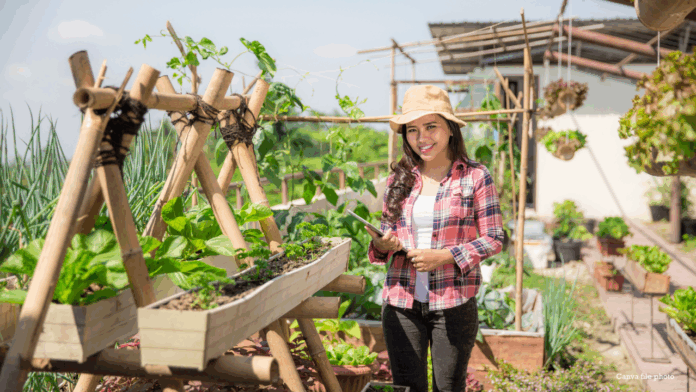The classic Filipino folk song “Bahay Kubo” is about the modest nipa hut that is surrounded by a variety of vegetables and celebrates a sustainable and uncomplicated way of life. Even in urban areas, this scene has encouraged many Filipinos to embrace the concept of starting their own “Bahay Kubo” garden as a means of fostering cultural pride, and food security.
Urban agricultural methods are essential to realizing this goal, particularly in settings with limited areas such as highly urbanized cities. Common techniques include hydroponics, container gardening, and vertical farming. For one, container gardening uses pots and repurposed materials to grow herbs like pandan or basil, while vertical gardening uses walls or trellises to grow vegetables like eggplants, pechay, or tomatoes.
Sustaining a Bahay Kubo garden requires making the most of both space and productivity. Companion planting is one method, wherein specific crops are planted together to maximize fertilizer consumption, repel pests, or enhance growth. For instance, putting tomatoes near garlic not only conserves space but also stops spider mites.
Composting organic waste into natural fertilizer also lowers home waste and guarantees healthier yields.
Currently, the Bahay Kubo concept is adopted by Bayer Crop Science’s Bayer Kubo Project to empower Filipino farmers and advance sustainable agriculture. This program gives urban farmers sustainable methods, equipment, and training to increase agricultural yields.
The concept combines contemporary technology with conventional methods and places a strong emphasis on educating people about ethical farming practices. In addition to uplifting nearby communities, it also sets an example for fusing innovation and tradition.
They highlighted that creating a Bahay Kubo garden has cultural and ecological value in addition to its practical advantages. It teaches urban dwellers, particularly young people, the importance of sustainability and self-reliance while reestablishing ties to the Filipino people’s agricultural heritage.
The Bahay Kubo garden serves as a cultural touchstone that ties Filipinos to their ancestry and symbolizes more than just agriculture. Creating such gardens encourages self-sufficiency, lowers food expenses, and helps ensure a sustainable future for urban families. By embracing this style of gardening, whether via personal endeavors or group initiatives like Bayer Kubo, resilience and environmental stewardship will be further encouraged.
Urban agricultural methods are essential to realizing this goal, particularly in settings with limited areas such as highly urbanized cities. Common techniques include hydroponics, container gardening, and vertical farming. For one, container gardening uses pots and repurposed materials to grow herbs like pandan or basil, while vertical gardening uses walls or trellises to grow vegetables like eggplants, pechay, or tomatoes.
Sustaining a Bahay Kubo garden requires making the most of both space and productivity. Companion planting is one method, wherein specific crops are planted together to maximize fertilizer consumption, repel pests, or enhance growth. For instance, putting tomatoes near garlic not only conserves space but also stops spider mites.
Composting organic waste into natural fertilizer also lowers home waste and guarantees healthier yields.
Currently, the Bahay Kubo concept is adopted by Bayer Crop Science’s Bayer Kubo Project to empower Filipino farmers and advance sustainable agriculture. This program gives urban farmers sustainable methods, equipment, and training to increase agricultural yields.
The concept combines contemporary technology with conventional methods and places a strong emphasis on educating people about ethical farming practices. In addition to uplifting nearby communities, it also sets an example for fusing innovation and tradition.
They highlighted that creating a Bahay Kubo garden has cultural and ecological value in addition to its practical advantages. It teaches urban dwellers, particularly young people, the importance of sustainability and self-reliance while reestablishing ties to the Filipino people’s agricultural heritage.
The Bahay Kubo garden serves as a cultural touchstone that ties Filipinos to their ancestry and symbolizes more than just agriculture. Creating such gardens encourages self-sufficiency, lowers food expenses, and helps ensure a sustainable future for urban families. By embracing this style of gardening, whether via personal endeavors or group initiatives like Bayer Kubo, resilience and environmental stewardship will be further encouraged.
Take inspiration from initiatives like the Bayer Kubo to start your own Bahay Kubo garden and see how this ageless idea can turn your city into a flourishing, sustainable sanctuary.



